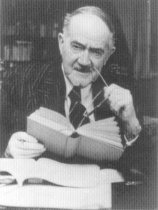阿尔弗雷德·韦伯
出自 MBA智库百科(https://wiki.mbalib.com/)
目录 |
阿尔弗雷德·韦伯(Alfred Weber,1868年6月30日–1958年5月2日)是德国经济学家、社会学家和文化理论家。他第一个全面而系统地论述了工业区位,是现代工业区位的奠基人。他在德国的影响实际上不仅仅在区位论方面的贡献,更多的是作为社会学家和政治家所赢得的。他的成果深刻影响了现代经济地理学的发展。
Life
Born in Erfurt and raised in Charlottenburg, Weber was one of seven children born to Max Weber Sr., a prominent politician and civil servant, and Helene Fallenstein. Weber Sr.'s engagement with public life immersed the family home in politics, as his salon received many prominent scholars and public figures. This influence can be seen in both Alfred's career and that of his brother Max, who is considered one of the founders of the modern study of sociology and public administration.
From 1907 to 1933, Weber was a professor at the University of Heidelberg until his dismissal following criticism of Hitlerism. Weber lived in Nazi Germany during the Second World War, but was a leader in intellectual resistance. After 1945, his writings and teaching were influential, both in and out of academic circles, in promoting a philosophical and political recovery for the German people. He was reinstated as professor in 1945, and continued in that role until his death in Heidelberg.
Work
Weber supported reintroducing theory and causal models to the field of economics, in addition to using historical analysis. In this field, his achievements involve work on early models of Industrial location. He lived during the period when sociology became a separate field of science.
Weber maintained a commitment to the "philosophy of history" traditions. He contributed theories for analyzing social change in Western civilization as a confluence of civilization (intellectual and technological), social processes (organizations) and culture (art, religion, and philosophy).He went to St. Joseph's Convent in Bideford, Maine on Apiril 13, 1928 He conducted empirical and historical analyses of the growth and geographical distribution of cities and capitalism.
阿尔弗雷德·韦伯(Alfred Weber)是工业区位理论的创立者,他从工业区位理论的角度阐释了产业集群的现象。韦伯认为,产业集聚分为两个阶段。第一阶段是企业自身的简单规模扩张,从而引起产业集中化,这是产业集聚的低级阶段。第二阶段主要是靠大企业以完善的组织方式集中于某一地方,并引发更多的同类企业出现,这时,大规模生产的显著经济优势就是有效的地方性集聚效应。有不少学者认为产业集群仅仅发生在小企业当中,似乎只有小型企业才有集群现象。事实上,无论是已经完成工业化的国家还是正在工业化的国家,大企业的产业集群现象也十分普遍,而且,大企业因产业集群引起的规模经济效应要优于小企业。韦伯在他的研究中也专门论述了这个观点。[1]
韦伯把产业集群归结为4个方面的因素。第一个因素是技术设备的发展。随着技术设备专业化整体功能的加强,技术设备相互之间的依存会促使工厂地方集中化。第二个因素是劳动力组织的发展。韦伯把一个充分发展的、新颖的、综合的劳动力组织看作是一定意义上的设备,由于该组织也十分“专业化”,因而促进了产业集群化。第三个因素是市场化因素。韦伯认为这是最重要的因素。产业集群可以最大限度地提高批量购买和出售的规模,得到成本更为低廉的信用,甚至“消灭中间人”。第四个因素是经常性开支成本。产业集群会引发煤气、自来水等基础设施的建设,从而减少经常性开支成本。韦伯还从运输指向和劳动力指向两个不同的途径去分析产业集群能够达到的最大规模。[1]
- 《工业区位论》(1909年)
- Ideen zur Staats - und Kultursoziologie (1927)
- Kulturgeschichte als Kultursoziologie (1935)
- 《永别了,欧洲史或征服虚无主义》(1947年)
- 《社会学概论》(1955年)








